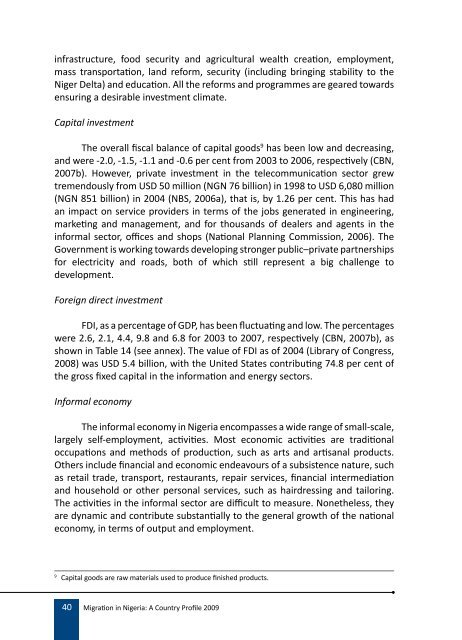Migration Profile on Nigeria - IOM Publications - International ...
Migration Profile on Nigeria - IOM Publications - International ...
Migration Profile on Nigeria - IOM Publications - International ...
You also want an ePaper? Increase the reach of your titles
YUMPU automatically turns print PDFs into web optimized ePapers that Google loves.
infrastructure, food security and agricultural wealth creati<strong>on</strong>, employment,<br />
mass transportati<strong>on</strong>, land reform, security (including bringing stability to the<br />
Niger Delta) and educati<strong>on</strong>. All the reforms and programmes are geared towards<br />
ensuring a desirable investment climate.<br />
Capital investment<br />
The overall fiscal balance of capital goods 9 has been low and decreasing,<br />
and were -2.0, -1.5, -1.1 and -0.6 per cent from 2003 to 2006, respectively (CBN,<br />
2007b). However, private investment in the telecommunicati<strong>on</strong> sector grew<br />
tremendously from USD 50 milli<strong>on</strong> (NGN 76 billi<strong>on</strong>) in 1998 to USD 6,080 milli<strong>on</strong><br />
(NGN 851 billi<strong>on</strong>) in 2004 (NBS, 2006a), that is, by 1.26 per cent. This has had<br />
an impact <strong>on</strong> service providers in terms of the jobs generated in engineering,<br />
marketing and management, and for thousands of dealers and agents in the<br />
informal sector, offices and shops (Nati<strong>on</strong>al Planning Commissi<strong>on</strong>, 2006). The<br />
Government is working towards developing str<strong>on</strong>ger public–private partnerships<br />
for electricity and roads, both of which still represent a big challenge to<br />
development.<br />
Foreign direct investment<br />
FDI, as a percentage of GDP, has been fluctuating and low. The percentages<br />
were 2.6, 2.1, 4.4, 9.8 and 6.8 for 2003 to 2007, respectively (CBN, 2007b), as<br />
shown in Table 14 (see annex). The value of FDI as of 2004 (Library of C<strong>on</strong>gress,<br />
2008) was USD 5.4 billi<strong>on</strong>, with the United States c<strong>on</strong>tributing 74.8 per cent of<br />
the gross fixed capital in the informati<strong>on</strong> and energy sectors.<br />
Informal ec<strong>on</strong>omy<br />
The informal ec<strong>on</strong>omy in <strong>Nigeria</strong> encompasses a wide range of small-scale,<br />
largely self-employment, activities. Most ec<strong>on</strong>omic activities are traditi<strong>on</strong>al<br />
occupati<strong>on</strong>s and methods of producti<strong>on</strong>, such as arts and artisanal products.<br />
Others include financial and ec<strong>on</strong>omic endeavours of a subsistence nature, such<br />
as retail trade, transport, restaurants, repair services, financial intermediati<strong>on</strong><br />
and household or other pers<strong>on</strong>al services, such as hairdressing and tailoring.<br />
The activities in the informal sector are difficult to measure. N<strong>on</strong>etheless, they<br />
are dynamic and c<strong>on</strong>tribute substantially to the general growth of the nati<strong>on</strong>al<br />
ec<strong>on</strong>omy, in terms of output and employment.<br />
9 Capital goods are raw materials used to produce finished products.<br />
40 <str<strong>on</strong>g>Migrati<strong>on</strong></str<strong>on</strong>g> in <strong>Nigeria</strong>: A Country <str<strong>on</strong>g>Profile</str<strong>on</strong>g> 2009

















